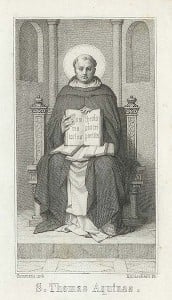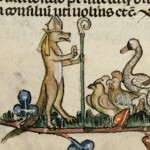 We’re blogging through St. Thomas Aquinas’ Compendium Theologiae, sometimes called his Shorter Summa. Find the previous posts here.
We’re blogging through St. Thomas Aquinas’ Compendium Theologiae, sometimes called his Shorter Summa. Find the previous posts here.
Thomas is nothing if not thorough. Having established that God’s Divine Word is identical to God Himself, he then goes on to eliminate the various ways that God’s Divine Word might have been distinct from God Himself.
Among things that are not distinct in essence, there can be no distinction according to species, time, or nature. Therefore, since the Word is consubstantial with the Father, He cannot differ from the Father in any of these respects.
Species, time, and nature. Thomas takes them one at a time. First, time. In earlier Chapters, Thomas established that God’s essence is His existence, and that God’s will and intellect are identical with His essence. God understands Himself by His intellect; and as Thomas showed in the chapters, His understanding of Himself is part of His intellect. And that means that He has always understood Himself:
There can be no difference according to time. The divine Word is present in God for the reason that God understands Himself, thereby conceiving His intelligible Word. Hence, if at any time there were no Word of God, during that period God would not understand Himself. But God always understood Himself during His whole existence, for His understanding is His existence.
And since there is no time when God has not understood Himself, His Word, which is His understanding of Himself, has always existed:
Therefore His Word, also, existed always. And so in the rule of Catholic faith we say that the Son of God “is born of the Father before all ages.”
We’ll look at species next week.
____
photo credit: Public Domain; source Wikimedia Commons












